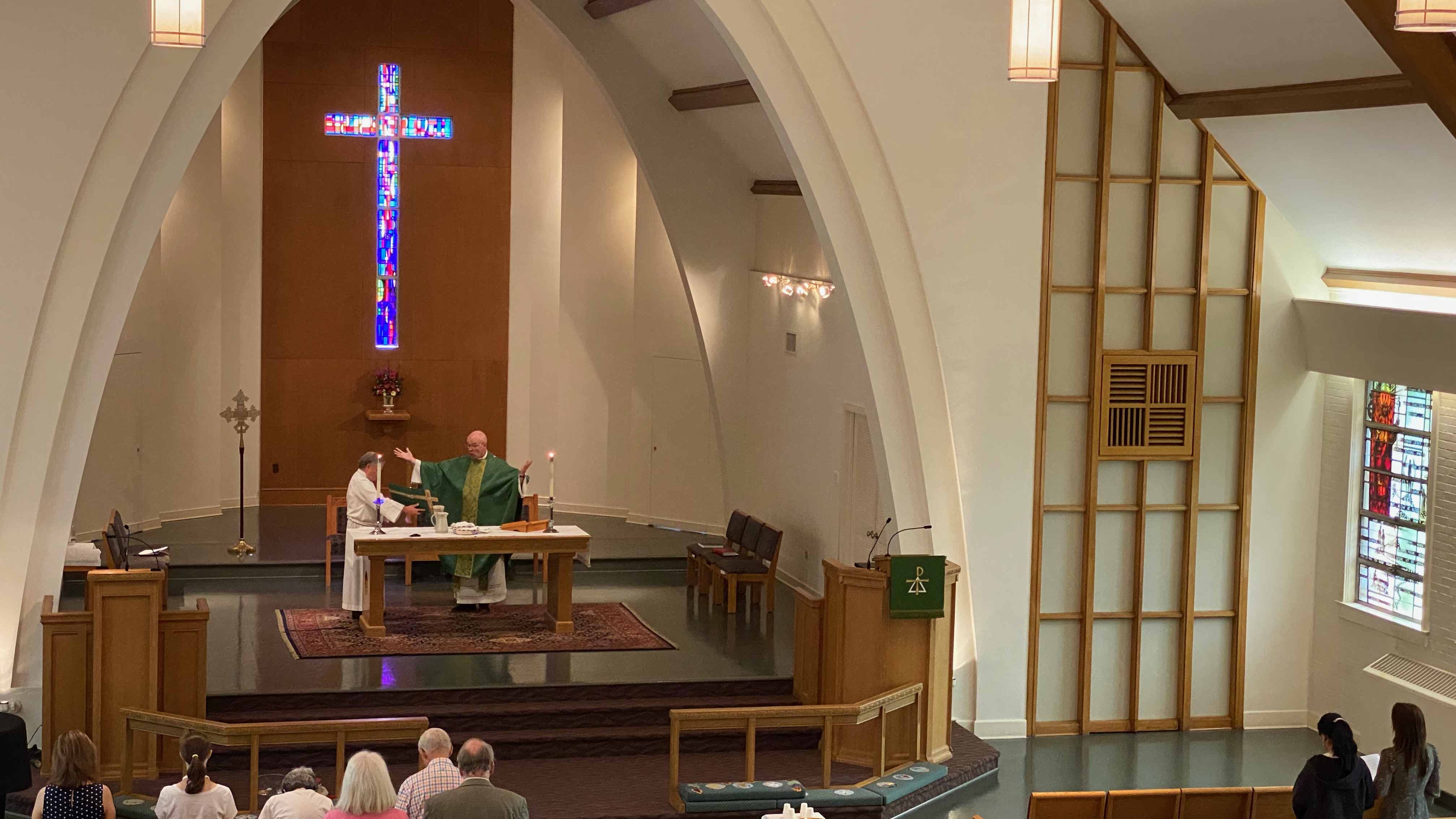Love of Neighbor is Central
Luther wrote, “We must accord our neighbors the same treatment [in times of plague as] in other troubles and perils also, and we owe it to our neighbors to do so. If our neighbors’ house is on fire, love compels me to run to help them extinguish the flames.” (397) For Luther, loving neighbors was the main principle that informed any response to the plague. So it is that neighbor love also grounds and guides our response to the pandemic in abstaining from meeting in person for public worship, and more.
The Scriptural Witness Informs Our Response
Luther’s entire narrative is punctuated with references to biblical stories and quotes from the scriptures to support and illustrate his points and observations. Luther writes, “Examples in Holy Scripture abundantly prove that to flee from death is not wrong in itself.” (395) He goes on to reference biblical stories about Abraham, Jacob, David, the prophet Uriah, and Moses, all of whom fled circumstances in order to save their lives. So, too, do we explore the scriptures for wisdom to inform how we respond to the pandemic.
Christian Ethics Involve Communal, not just Individual Responses
One of the most central insights I take from Luther in his writing on faithful responses to plague is that the ethically right thing to do involves the entire community in helping those afflicted by the plague. In other words, Christian ethics is not just an individual endeavor involving primarily individual responses. Luther writes, for example, “Those who are engaged in a spiritual ministry such as preachers and pastors must likewise remain steadfast before the peril of death. We have a plain command from Christ, ‘A good shepherd lays down his life for the sheep but the hireling sees the wolf coming and flees” [John 10:11]. For when people are dying, they most need a spiritual ministry which strengthens and comforts their consciences by word and sacrament and in faith overcomes death. However, where enough preachers are available in one locality and they agree to encourage the other clergy to leave in order not to expose themselves needlessly to danger, I do not consider such conduct sinful because spiritual services are provided and because they would have been ready and willing to stay if it had been necessary.” (392-393) In short, if the community’s needs are being taken care of, then a pastor or others in helping professions may consider retreating to safer places. My individual responses are intimately connected with our responses taken together as a whole. It is with thanksgiving, therefore, that I think of and more deeply appreciate the efforts of our many frontline workers and first responders who offer communal responses in the case of our current pandemic.
Responses take Seriously Context and Common Sense
Luther does not set out to prescribe a one-size-fits-all response to the plague. In answer to the query of the writing’s title, “Whether One May Flee from a Deadly Plague,” Luther’s answer basically is, it depends. The quotation cited immediately above reflects this sensibility that context and common sense guide our responses.
Faith Alone Remains Central to Our Response to Plague
Those who resolve to stay behind to assist those in need during the ravages of the plague, Luther says, “uphold a good cause, namely, a strong faith in God, and deserve commendation because they desire every Christian to hold to a strong, firm faith. It takes more than a milk faith to await a death before which most of the saints themselves have been and still are in dread. Who would not acclaim these earnest people to whom death is a little thing?” (391-392) Sola fide, faith alone, is not just a theological abstraction, but an existential reality that can inform our courageous responses to crises. That said, Luther does not disparage in his writing on responses to the plague those who conclude that their faith is weak.
Sins of Omission have Murderous Consequences
Look at this harsh assessment by Luther! He writes, “Those who do not [make sacrifices] for their neighbors, but instead forsake them and leave them to their misfortune, become murderers in the sight of God, as St. John states in his epistles, ‘All who hate a brother or sister are murderers,’ and again, ‘How does God’s love abide in anyone who has the world’s goods and sees a brother or sister in need and yet refuses to help?’ [1 John 3:15]” (403) This judgment may apply both to individuals and whole communities. Luther’s logic is in keeping with his Small Catechism explanation to the Commandment, “You shall not kill,” where omitting to help neighbors in need is a form of failing to keep the commandment and is tantamount to murder – a sin of omission with murderous consequences.
We are Called to Respect Guidance from Medical Science
The following quotes from Luther largely speak for themselves, and you can do the math on your own about those Luther might address today if he were our contemporary:
“[Some] are much too rash and reckless, tempting God and disregarding everything which might counteract death and the plague. They disdain the use of medicine; they do not avoid places and persons infected by the plague, but instead lightheartedly make sport of it and wish to prove how independent they are. They say that it is God’s punishment; if he wants to protect them he can do so without medicines or our carefulness. This is not trusting God, but rather tempting him. God has created medicines and provided us with intelligence to guard and take good care of the body so that we can live in good health.” (403)
“It is even more shameful for [the reckless] to pay no heed to their own bodies and fail to protect them against the plague the best they are able, and then to infect and poison others who might have remained alive if they had taken care of their bodies as they should have. They are thus responsible before God for their neighbor’s death and are a murderer many times over.” (403)
“No, my dear friends, that is no good. Use medicine; take potions which can help you; fumigate house, yard, and street; shun persons and places wherever your neighbor does not need your presence or has recovered, and act like someone who wants to help put out the burning city. What else is the epidemic but a fire which instead of consuming wood and straw devours life and body?” (403-4)
In brief in relation to Luther’s words quoted above, I can hear the reformer say to us today something like, “Don’t gather in large groups, keep a safe distance, wash your hands, wear your facial covering, respect the wisdom and guidance of medical professionals.”
There is a Crucial Role for Government and Public Health Infrastructure
Luther affirms the importance of good government in responding to the plague. He writes, “It would be well, where there is an efficient government in cities and states, to maintain municipal homes and hospitals staffed with people to take care of the sick so that patients from private homes can be sent there…” (398) Likewise, our communal response to the pandemic affirms the important role of government and other agencies and organizations in caring for those in need.
Loving Our Neighbors Combats Evil
Luther took seriously the ill effects of wickedness and evil in his day. His lively imagination included awareness of diabolical forces at work. But love of neighbor is an antidote that combats and trumps diabolical forces. Luther writes, “Because we know that the devil’s game is to induce fear and dread, we should instead minimize it, take courage just to spite and annoy him, and send those terrors right back to him. And we should arm ourselves with this answer to the devil: ‘Get away, you devil, with your terrors! Just because you hate it, I’ll spite you by going the more quickly to help my sick neighbor. I’ll pay no attention to you.” (399)
So it is that Luther’s words and wisdom echo through the centuries to guide and encourage us in our own day and for our continued responses to the pandemic that is plaguing us. Thanks be to God for the wisdom of the saints.
In Christ Jesus,
Pastor Jonathan Linman






